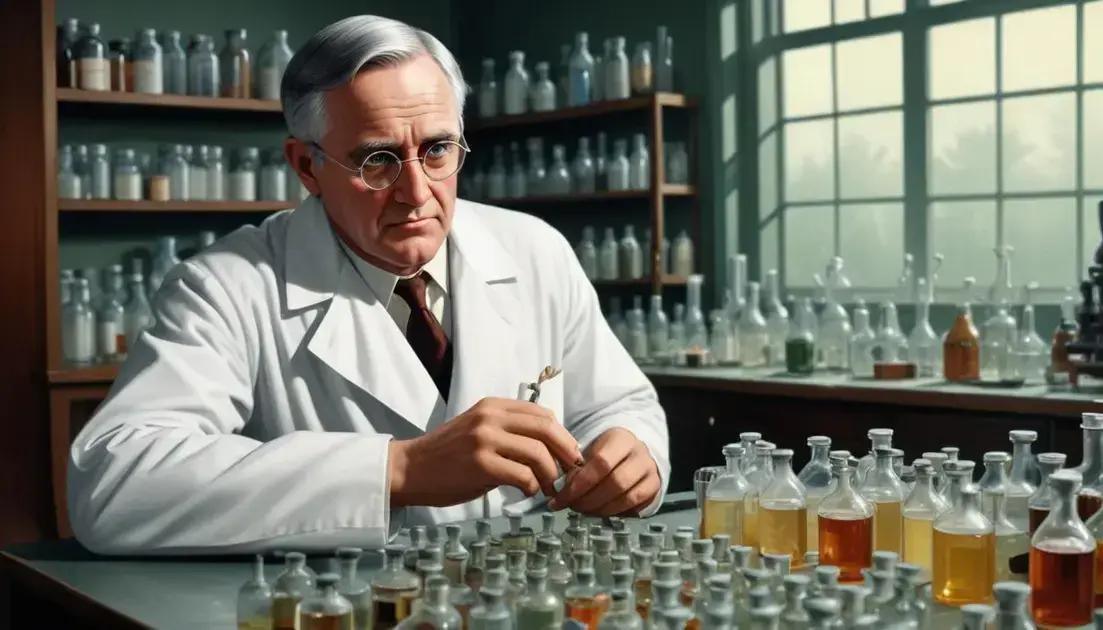
Fleming and Penicillin: The Cure Born by Chance
Penicillin, discovered by Alexander Fleming in 1928, is the first true antibiotic, transforming medicine by providing effective treatment against bacterial infections. Its introduction saved countless lives, especially during World War II by treating wounds and infections. This groundbreaking discovery led to the development of many other antibiotics, making it a cornerstone of modern healthcare. However, the rise of antibiotic resistance poses new challenges, underscoring the need for ongoing research and development in the field of antibiotics.
Imagine a world where infections were a death sentence… In that landscape, Penicillin arrived, changing everything! Let’s explore how a simple mold revolutionized healthcare.
Introduction
In 1928, a remarkable chance discovery changed the world of medicine forever. Alexander Fleming, a Scottish bacteriologist, stumbled upon a mold that was unlike anything seen before. This mold, identified as Penicillium notatum, produced a substance that could kill bacteria. It was the birth of a powerful antibiotic known as penicillin.
Before this discovery, bacterial infections were often deadly. Simple cuts or common illnesses could lead to severe complications. With penicillin, treatment methods transformed dramatically, offering hope where there was once despair.
Fleming’s find wasn’t just about the mold itself. It sparked years of research and development. Scientists worked to isolate the active ingredient in the mold. This challenge marked the beginning of a new era in medicine.
Can you imagine what life was like before penicillin? People feared infections because there were so few options for treatment. Penicillin opened doors to treat many illnesses effectively. It paved the way for modern antibiotics as we know them today.
Thanks to penicillin, millions of lives have been saved. It revolutionized treatment during World War II and beyond. Its impact is felt in hospitals around the globe, continuing to fight infections that were once fatal.
The Discovery of Penicillin
The discovery of penicillin was a game changer for medicine. In 1928, Alexander Fleming noticed something unusual in his lab. He found a mold contaminating one of his petri dishes. This mold, known as Penicillium notatum, was not just ordinary. It produced a substance that killed surrounding bacteria.
Fleming realized this mold could be the key to treating infections. Bacteria cause illnesses, and finding a way to fight them was vital. His observation led to exciting possibilities. However, it took years to develop penicillin into a usable drug.
After Fleming’s find, scientists like Howard Florey and Ernst Boris Chain entered the scene. They worked hard to extract and purify penicillin. Their teamwork showed how collaboration can lead to big discoveries. In the 1940s, penicillin was mass-produced, and its effectiveness became clear.
Imagine being in a time when infections were deadly. Penicillin offered hope. It became a life-saving treatment during World War II, helping countless soldiers recover from serious wounds. This discovery changed healthcare forever.
Today, penicillin is considered the first true antibiotic. It set the stage for many other antibiotics that followed. Its legacy continues, reminding us how a simple mold changed the world.
Impact on Medicine
The impact of penicillin on medicine has been immense and far-reaching. It marked the beginning of antibiotics, changing how we treat infections. Before penicillin, even small infections could be deadly. People lived in fear of bacteria.
Once penicillin became available, it transformed medical practices. Doctors could effectively treat pneumonia, strep throat, and even serious wounds. Patients started to recover faster, leading to better health outcomes.
During World War II, penicillin saved countless lives. Soldiers who were injured in battle received treatment that prevented infections. This helped them to heal and return home sooner.
After the war, penicillin paved the way for other antibiotics like tetracycline and amoxicillin. Each new drug added to our ability to fight diseases. These medications have helped millions of people around the globe.
Penicillin didn’t just change treatments; it also changed research. Scientists began to explore how to combat antibiotic resistance. This issue arises when bacteria adapt and become immune to antibiotics. Research is ongoing to find new solutions.
Overall, the introduction of penicillin has saved millions of lives. It has changed the landscape of modern medicine and improved our quality of life significantly.
Conclusion
Penicillin has changed the world of medicine in amazing ways. It opened doors to new treatments and helped save millions of lives. This antibiotic became a crucial tool for doctors everywhere.
Its discovery led to others joining the fight against infections. Antibiotics reduced deaths from common illnesses. Today, we have a whole range of antibiotics to choose from.
However, the rise of antibiotic resistance is a growing concern. Bacteria are learning to fight back. We must continue to research and develop new treatments.
Penicillin’s legacy is one of hope and healing. It reminds us of the power of scientific discovery. Thanks to this mold, we can treat infections that once were deadly.
Conclusion
In conclusion, penicillin has had a profound impact on medicine and our lives. This amazing discovery opened the door to antibiotics, changing the way we treat infections. With penicillin, doctors could effectively combat diseases that were once deadly.
Its influence extends far beyond its time. Penicillin paved the way for many other antibiotics, helping millions recover from illnesses. However, we also face the challenge of antibiotic resistance today. Bacteria are evolving, making it crucial for ongoing research.
Despite these challenges, the legacy of penicillin is a reminder of what science can achieve. This simple mold changed the course of healthcare and continues to inspire hope. As we move forward, we must protect and advance the benefits that antibiotics bring to our world.


